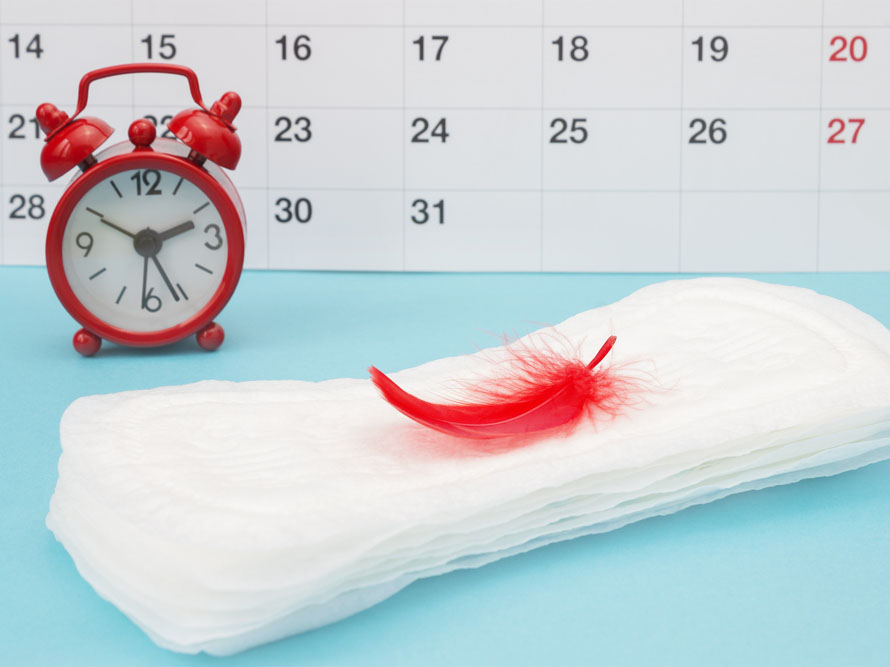Contents
- Does sex affect menstrual cycle duration?
- 11 reasons your period could be late that have nothing to do with being pregnant
- 1. You’ve Got polycystic ovary syndrome
- 2. You contracted the pelvic inflammatory disease (PID)
- 3. Your new exercise regimen could be depleting hormone levels that make your period happen
- 4. Your weight has been changing
- 5. You recently began the keto diet plan or are currently after it
- 6. You have been getting less sleep than Normal
- 7. You used emergency contraception sometime in the Last Few Months
- 8. You are experiencing premature menopause
- 9. You’re very stressed
- 10. You are breastfeeding
- 11. There is a problem with your thyroid
- Conclusion
Can your menstrual cycle shift after being sexually active? Now we are answering this and some different questions related to gender and your cycle.
Does sex affect menstrual cycle duration?
Menstrual cycle length varies for every girl. Does this depend upon the frequency of sexual intercourse?
To answer this query, a range of studies were conducted at the USA from the 1970s.
They involved girls with distinct sexual frequencies that did not use hormonal contraceptives or intrauterine devices and obtained their initial period at least seven years before the research.

It was that one of the respondents that had sex frequently, the menstrual cycle length mainly ranged from 26–33 times (29.5 times on average).
This length is thought to be the most beneficial for conception because such cycles are often ovulatory.
In girls having intermittent gender, the menstrual cycle length ranged on a broader scale; quite short or long spans, which are ordinarily anovulatory, were detected more frequently than those from the group with more regular sexual intercourse.
11 reasons your period could be late that have nothing to do with being pregnant
1. You’ve Got polycystic ovary syndrome
Whenever someone has polycystic ovary syndrome (PCOS), their egg occasionally does not grow on schedule. This is because the illness causes hormone imbalances, which directly affect the ovaries. Consequently, childbirth and ovulation can be postponed.
Besides irregular intervals, other frequent indicators of PCOS include acne, thinning hair, and weight reduction. The illness has no cure, but going on birth control might help regulate your period. It is worth consulting your physician if you are exhibiting any combination of these indicators.
2. You contracted the pelvic inflammatory disease (PID)
Another condition that may severely impact your menstrual cycle is pelvic inflammatory disease (PID).
PID occurs when bacteria makes its way to the vagina and vagina. Typically, it starts as a different sexually transmitted disease, such as chlamydia or gonorrhoea, that introduces external symptoms. As the infection spreads into the tissues of the uterus, it may result in difficulties with menstruation.
The Office on Women’s Health lists irregular menstrual cycles (such as late intervals ) as among the signs of PID. There are different symptoms related to it also, such as pelvic pain, fever, and pain during sexual activity.
Should you guess that PID is the main reason behind your abnormal menstruation patterns, then it is essential to find a physician. Untreated PID may result in serious complications, such as rectal tube scarring and infertility.
3. Your new exercise regimen could be depleting hormone levels that make your period happen
Even when you are not training excessively strenuously, some change in practice habits may cause changes in your period.
Strenuous exercise reduces the body’s estrogen levels, and because estrogen is the principal hormone that triggers ovulation, too little, it may slow down the whole menstrual cycle. Sometimes this could lead to delays that persist as long as many months.
4. Your weight has been changing
Both the fat and cartilage cells throughout the entire body create estrogen. This usually means a sudden increase or reduction in weight can change your period.
A study printed in the Endocrinology and Metabolism Journal additionally discovered that intermittent intervals are more prevalent in people who abruptly gain or shed weight.
5. You recently began the keto diet plan or are currently after it
The rigorous low-carb keto diet may alter how frequently your cycle happens.
Registered nutritionist Vanessa Roster formerly told INSIDER the depletion of carbs in the body could diminish the body’s energy levels, which affects the body’s ability to menstruate.
6. You have been getting less sleep than Normal
Our bodies need sleep for lots of reasons, for example, regulating our temperature and making sure that our organs are regularly working. Considering that the uterus itself is an organ, it must come as no real surprise that too little sleep may negatively affect its ability to perform its job.
The American Academy of Sleep Medicine reported that people with sleep disorders, such as delayed sleep deprivation, were prone to have an irregular menstrual cycle.
7. You used emergency contraception sometime in the Last Few Months
If you have taken emergency contraception, such as Plan B, as a preventative measure after unprotected intercourse, there is a chance it may be creating your time very late. Princeton reported many studies which demonstrated menstrual cycle spans were modified after girls took emergency contraception.
8. You are experiencing premature menopause
Among those defining indicators of menopause is that the entire disappearance of the menstrual cycle for over 12 months. Most people that have a menstrual cycle expect they’ll experience this sometime during their late 40s or early 50s. However, for a few, it may happen sooner.

Perimenopause refers to the temporary phase before full-blown menopause happens. In this period, the ovaries begin to produce less estrogen than usual, which causes you to receive your period less frequently.
Even when you’re under the standard menopausal age, this isn’t something you ought to rule out completely. The American Pregnancy Association states one of every 1,000 women between age 15 and 29 will undergo premature menopause.
Generally, if night sweats or vaginal dryness accompany your late period, then you might choose to ask your doctor about checking for perimenopause.
9. You’re very stressed
Feeling stressed can postpone your menstrual cycle. Multiple printed studies have reported that anxiety may be a massive element in delaying your period.
Worrying about your interval could raise your anxiety levels and postpone your period more.
10. You are breastfeeding
Reports that breastfeeding is often connected with menstrual irregularities. This is mainly because gingivitis stimulates prolactin generation, a pituitary gland hormone which enables the body to make breast milk.
At precisely the same time, prolactin is known to impede the menstrual procedure. This is because if it’s being generated within the body, it retains other hormones, such as estrogen, increased. Elevated levels of hormones imply the body does not experience that fall in amounts it ought to activate your menstrual cycle.
Usually, late intervals associated with breastfeeding aren’t a reason for concern, unless you are experiencing other symptoms or you have recently given birth and had unprotected intercourse. Though a lot of individuals knowingly use breastfeeding as a strategy to postpone ovulation (and so their intervals ), it does not mean it is not possible to become pregnant while breastfeeding.
11. There is a problem with your thyroid
The thyroid gland is a small, butterfly-shaped gland situated in the base of their throat, and it has a lot of responsibilities. It is most famous for regulating the body’s metabolism and temperature. However, when it’s generating too few or too many hormones, it may affect your menstrual cycle.
Hypothyroidism often causes menstrual discomforts, such as both absent and late periods. A study by the late’90s noted that hyperthyroidism, an overactive thyroid, can throw your cycle off, also.
Conclusion
Delayed intervals can be stressful and can at times lead sexually active people to believe they are pregnant. However, a late range could result from several things which are not associated with pregnancy.
Sometimes, a late interval can be indicative of other underlying health conditions. Obviously, in case a new range is causing you trouble, the best way to attain peace of mind is by consulting with your physician.


